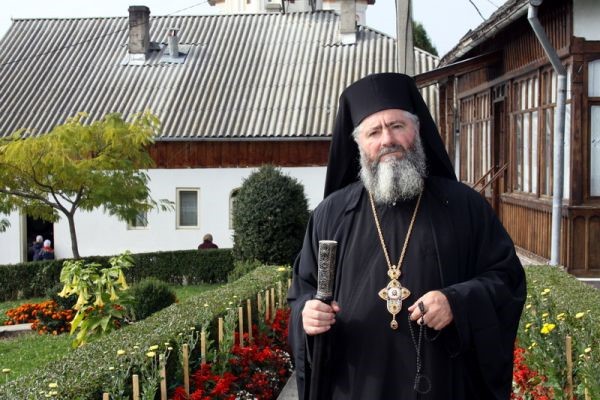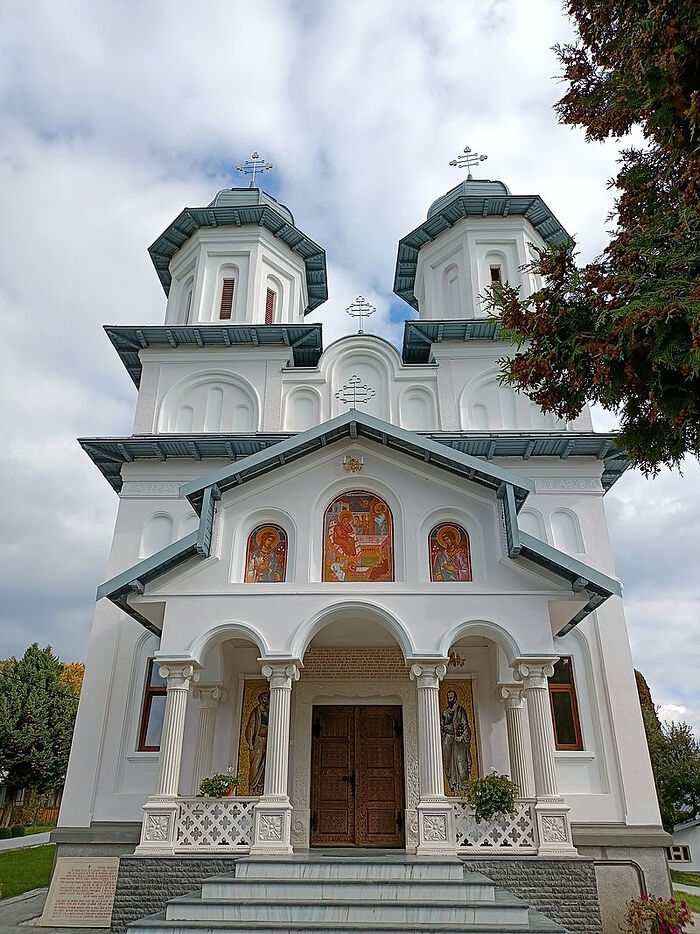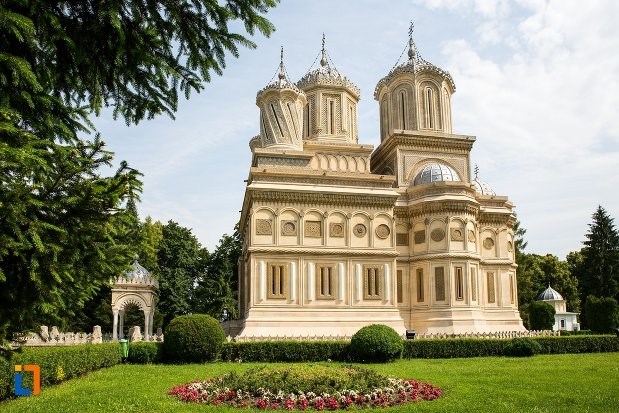I first saw Fr. Clement (Păunescu), the abbot of Slănic Monastery in Argeș County, one summer Sunday afternoon at Aninoasa Monastery, where he also served as confessor. Fr. Clement served the Liturgy, after which he gave a fiery sermon. I liked his clear and frank speech, bold and touching upon the very essence of things. I also liked his patriarchal appearance, his smile so full of kindness and sincerity.
Then I learned that Father has an unusual life story: At thirty-five years of age, he became a monastic along with his wife and son, who was still a teenager then. And the initiative belonged to none other than this son. He so loved Christ that he wanted to serve Him alone. But several years later, when his parents were already monastics, each in their own monastery, the boy, who was then a novice at Slănic Monastery and had also graduated from seminary, decided to return to the world. Today he’s a successful lawyer and good family man, with a wife and four children.
Fr. Clement doesn’t regret the step he took. In faith and prayer, he has acquired a deep peace of mind and believes that God made this choice for him. God helped him break away from the world and cleanse himself of the thoughts that were calling him back to the world. Every believer dreams of this victory over the thoughts, achieved through prayer.
 Protosinghel Clement (Păunescu)
Protosinghel Clement (Păunescu)
“Fear also begins with the mind”
—Father, no one knows the constant struggle with the thoughts that block the path to pure, true prayer quite like a monk who has completely devoted his life to God. It’s a barrier that all believers try to overcome…
—It’s impossible to begin the battle with the thoughts without understanding your spiritual state, for the thoughts stem from the uncertainties of life. What do I want? Where is my path leading? We have to truly believe that the only true path is salvation; that is, the acquisition of eternal life. And then you’re also in need of a spiritual father who will help you see which thoughts tempt you most of all. The thoughts connected with the passions take power over us and destroy us. For example, you’re tormented by the passion of drunkenness, and you say you’ll give it up, but only after you drink at least a glass. This is an illusion. From one glass, you hit the point where you no longer even remember yourself, slain by the sin of drunkenness.
Sin begins with a thought, so we have to carefully monitor what we’re thinking about! We have to reject the thoughts that fuel the passions. But there’s no universal recipe here. Everyone learns to curb their aspirations and thoughts in their own ways. Therefore, it’s important to constantly consult with your spiritual father and show him obedience.
 Aninoasa Monastery, St. Nicholas Church
Aninoasa Monastery, St. Nicholas Church
But we shouldn’t approach our spiritual father like a psychologist, trying hard to find rational solutions, but as an advocate before God, with an open heart. And the heart opens with prayer. So let us be certain of the power of prayer!
In this regard, I want to give the faithful one piece of advice: Don’t choose a famous, popular spiritual father, or someone whom others have suggested to you. Go to the Divine Liturgy in some church, then in another, and another, and search until you feel a commonality with the priest there and you see that he answers your problems with his preaching, without you even asking him anything. Stop there, because it’s only with that priest that you can truly confess.
Healing begins with an overall confession, reaching to the most hidden evil lurking within us. A priest isn’t a prosecutor to interrogate you, or a judge to punish you—he’s a mediator. He’s the one through whom you really speak with God. He’s a witness and bearer of spiritual help.
As Fr. Raphael (Noica) says, in Confession, a priest should listen to what the Spirit tells him, and not judge by the Pedalion [the Rudder]. And if the Spirit tells you to commune him, even if the Pedalion wouldn’t allow it, then commune him. If you don’t hear anything from the Spirit, don’t say anything, and invite the believer to come again. When you listen to God, you aren’t mistaken, and your conscience is calm.
 The Church of the Nativity of the Theotokos in Slănic Monastery. Photo: Juliana Ciuca
The Church of the Nativity of the Theotokos in Slănic Monastery. Photo: Juliana Ciuca
—But we have to fight not just with the thoughts related to sins, but also with the thoughts stemming from everyday cares, and also from fear. How can we protect ourselves from them?
—Fear also starts with the mind. I’ve been in such circumstances. One day I was driving from Câmpulung Muscel to Pitești, and after a few days without sleep, I felt completely exhausted. Then I suddenly felt like I was starting to suffocate, and since I have heart problems, I began to panic. “I’m going to die,” I thought. I was afraid I would cause an accident, so I pulled over, stopped, and started praying, but not to make it out alive, but with the thought that if I die, that it would happen in a Christian manner. After all, we believe that “as death finds you, so you will be judged.”
I closed my eyes and started praying. After five minutes, I felt better, and after ten minutes, there was no longer any trace of the sickness. And I realized that our medicine is in accepting that anything can happen to you; but don’t despair, because everything is from God, and you have to pray to Him.
In most cases, people can’t make it through difficult trials because they can’t accept what is happening with them. Modern man, for example, doesn’t accept death. He has self-love, which doesn’t take transcendence into account; that is, the reality that we’re not just a body, but also a soul, and that the soul is immortal.
 Iconostasis of the Nativity of the Theotokos Church at Slănic Monastery
Iconostasis of the Nativity of the Theotokos Church at Slănic Monastery
—That means we have to accept everything that happens to us?
—Yes, and without grumbling against God, and so we’ll become closer to Him. But people today have a poor understanding of this. And even if they don’t blame God, they shift the blame to others. In family life, for example, only the other is to blame when some difficulties arise or something doesn’t go well. And in the spiritual life, we simply expect that the priests, the Church hierarchy, or Christ will resolve everything for us, and we won’t do anything for it ourselves.
Our running from suffering and responsibility, and our desire to lead a comfortable and carefree life stem from self-love, which opens us up to bad thoughts. And they torment us and take away our peace. And the agitation causes physical illness and spiritual death.
If we want to win the fight against dark thoughts and find peace, we have to accept the evil that happens to us for our sins and not try to be right in everything at all costs, but to love others in deeds and not just in words, trying to at least muffle our self-love, if we can’t give it up.
Joy is the health of the soul
 Cells at Slănic Monastery. Photo: Juliana Ciuca
Cells at Slănic Monastery. Photo: Juliana Ciuca
—Before our interview, you said that science has proven something amazing: that 60% of our bodily health is associated with joy. The more we manage to rejoice, the healthier we are physically and mentally. It’s great news, if only we knew how to find this joy, which it seems there is less and less of in the world, which is so full of hardships and dangers.
—We also find joy through prayer, but only good thoughts should be coupled with prayer, or follow after it. For example, you wake up in the morning and you think: “I’m alive and healthy!” It’s a cause for joy; you can’t help but thank God for it. That’s how a good thought turns into prayer. Or you realize how important it is that people who are dear to your heart are with you now: parents, spouse, children—and you give thanks for it. Or think about how good it is that you can put your daily bread on your table, and give thanks to God. Or look out the window and rejoice in the sunny day, a blossoming tree, or freshly fallen snow. After all, it’s all given by God for your delight!
Thinking about the good and beautiful things we have and what surrounds us, we give place to joy and drive away the dark thoughts. And if we reinforce joy with prayer, then we’re truly happy. Joy is the health of the soul. This is the meaning of the exhortation repeated by the Savior: Rejoice! and also: Peace be unto you. Joy brings peace. Peace and enjoyment are the most important things for our life both here and there, for our salvation.
—You’ve been talking about the thoughts that we have to drive out so that it’s possible to pray. Do you believe in their power? Do you believe we can change reality with our thoughts?
—Yes, but we have to be careful, because we can change it both in a positive and a negative way. In recent times, thoughts are most often suggested to us by the evil one. Now he has such sophistical means as TV and the internet at his disposal. When we watch TV or look at stuff online for hours, the human mind munches on the thoughts of others—thoughts that are brought into it from the outside—and it no longer gives birth to its own.
Subconscious messages are transmitted through such means of communication, damaging our judgment. Therefore, Fr. Cleopa said: “Whoever watches TV, I don’t commune for three years.” It wasn’t a punishment, but a way to cleanse the mind of those who want to grow spiritually.
Even children who just watch cartoons are harmed, because their minds are shaped in a certain way. There are scientific studies confirming these truths. It would be good if little children didn’t watch TV until they’re old enough to distinguish good from bad themselves, and it would be better if they didn’t start working at a computer until they’re fifteen or sixteen.
Of course, both TV and the internet can be useful, but you have to gain some maturity and not abuse them. Recently, social networks like Facebook have been in high demand. People say they socialize there. Yes, they socialize with the entire world, but they forget to socialize with those near them—with their family, spouse, children, parents, real friends. But they would get much more if they’d talk with them.
There’s no greater joy than talking with friends and family face to face. Live communication gives emotions, joy, and awakens so many sources of joy, which we’ve been talking about. In the interwar period (between WWI and WWII), we had four or five children in city families and ten or eleven, or even up to twenty in the villages. Now that’s where you could’ve seen some socialization!
Returning to our topic, yes, how we live depends on our thoughts, provided that they’re good thoughts. But, to have a good thought, we have to remove the sources of hatred and evil from our lives. Otherwise, the fight becomes extremely difficult, and the risk of losing is very high. Fr. Dumitru Staniloae said: “Don’t try to change the world. Change yourself and part of the world will become better, and all of mankind will benefit from it.”
It's the same with the thoughts. My good thought contributes to making the whole world better, and my bad thought makes the whole world worse.
We’re surrounded by the invisible world, the world of spirits, good and evil. An evil spirit comes to me with an evil thought, I accept it, and then this evil is truly realized. Thus, we draw evil to ourselves by this thought. Let us cast away every bad thought with the reasoning: “Nothing bad will happen to me. God will take care of me. I’m sure of it.” And if something still happens to me, I’ll be certain that God is giving me a sign through it, that I sinned somehow.
Prayer is also the best protection for us. When we begin the day, let’s make a prostration and ask God, the saints, and our guardian angels to take care of us—and thus we will drive out any fear. If we have given our lives to the Lord, what else is there to be afraid of? I’m personally absolutely sure that nothing bad will happen to someone who prays in the morning.
Grandma and a good thought
—Have you had some personal experience where a thought changed reality?
—I had a very pious grandmother who really loved me, and when I got married, she raised my son until he was five. She never left the Church and would always give me examples from the lives of the saints, Holy Scripture, and some priests’ homilies. And my son received faith from her. He grew up in faith.
But I was an atheist until I was thirty. After the revolution (1989), I was talking with my grandma one evening, after which the thought came to me: Why is this woman so radiant? She’s so poor, simple, and hasn’t seen any particular joys in her life. What does she find in the Church? Why is she so grateful to it? What she said made me think. I mean, she was a lot happier than me. She had no fears at all. Faith filled her life with joy.
 Curtea de Argeș Monastery
Curtea de Argeș Monastery
This was in September 1990. The next day was Sunday, and I went to church, to Curtea de Argeș Monastery, to the relics of St. Filofteia. I stood through the whole service without understanding anything. I went again, but I left after five minutes, because I was tired of standing. But after that Sunday, I never missed the Divine Liturgy again. Something—maybe the talk with my grandma, or the thoughts she awakened in me—compelled me to go to church again and again and move forward on the path of faith.
 The holy relics of St. Filofteia of Romania
The holy relics of St. Filofteia of Romania
Everything began with one question: What makes grandma happy? God heard my thought like a prayer and answered me. Apparently, it was also important that grandma was praying for me. Thus, I was convinced from my personal experience that a thought can change reality: It made me, an atheist, become a believer.




